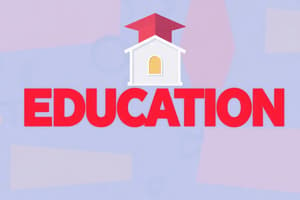Podcast
Questions and Answers
What is the main focus of a Master's degree program?
What is the main focus of a Master's degree program?
- Providing a broad understanding of the chosen field
- Specializing in a specific area and independent research (correct)
- Involving extensive research and thesis production
- Encouraging critical thinking and creativity
Which qualification involves the production of an original thesis?
Which qualification involves the production of an original thesis?
- Doctoral degree (PhD) (correct)
- Bachelor's degree
- Master's degree
- Certificate
What is one of the challenges faced by third level education regarding students' mental health?
What is one of the challenges faced by third level education regarding students' mental health?
- Limited space and resources
- Inability to find employment in chosen fields
- Stress, anxiety, and mental health issues (correct)
- Increased debt due to high expenses
What is a common concern related to employment outcomes for third level graduates?
What is a common concern related to employment outcomes for third level graduates?
Which qualification typically lasts for one to two years?
Which qualification typically lasts for one to two years?
What is a key advantage of third level education in terms of networking and professional development?
What is a key advantage of third level education in terms of networking and professional development?
What do hierarchical levels in education typically include?
What do hierarchical levels in education typically include?
What institutions are included in third level education?
What institutions are included in third level education?
What is the focus of institutes of technology in third level education?
What is the focus of institutes of technology in third level education?
What distinguishes universities from institutes of technology in third level education?
What distinguishes universities from institutes of technology in third level education?
What type of learning approach do colleges in some countries typically emphasize in third level education?
What type of learning approach do colleges in some countries typically emphasize in third level education?
In the context of third level education, what does tertiary refer to?
In the context of third level education, what does tertiary refer to?
Study Notes
Understanding Third Level and Hierarchical Levels
The term "third level" can refer to various contexts, but in this article, we'll focus on its application in hierarchical organization, specifically in the realm of education and knowledge organization.
Hierarchical Levels in Education
Hierarchical levels in education refer to a system that groups different stages of learning, typically organized into primary, secondary, and tertiary or third level. Third level education encompasses higher education institutions and programs beyond secondary school, which includes colleges, universities, and institutes of technology.
Third Level Education Institutions
Third level education institutions offer programs that build upon secondary education, allowing students to specialize in their chosen fields and obtain advanced qualifications. The types of third level institutions are diverse:
- Universities: These are research-intensive institutions that offer a wide range of academic disciplines, including arts, humanities, sciences, social sciences, and professional fields.
- Institutes of technology: These institutions focus on providing vocational and technical education and training in fields such as engineering, business, and computing, with a strong emphasis on practical skills.
- Colleges (in some countries): These institutions may offer a mix of academic and vocational programs, with a focus on applied learning and practical skills.
Qualifications and Programs
Third level education offers a variety of qualifications, including certificates, diplomas, degrees, and postgraduate qualifications. The most common qualifications are:
- Bachelor's degree: Usually a three-year program that provides students with a broad understanding of their chosen field.
- Master's degree: A one- to two-year program that allows students to specialize in a specific area and undertake independent research.
- Doctoral degree (PhD): A three- to four-year program that involves extensive research and the production of an original thesis.
Advantages of Third Level Education
Third level education has several advantages, including:
- Enhanced career opportunities: Higher qualifications can lead to better job opportunities and higher salaries.
- Personal and intellectual development: Third level education encourages critical thinking, problem-solving, and creativity.
- Networking and professional development: Third level education provides opportunities to connect with professionals and peers in your field and develop your network.
- Research and innovation: Third level education encourages research and innovation, contributing to the growth of knowledge and the development of new technologies.
Challenges of Third Level Education
Third level education also faces several challenges, including:
- High costs: Tuition fees and living expenses can be prohibitive for many students, leading to high levels of student debt.
- Competition for places: Due to limited space and resources, admission to third level education programs is highly competitive.
- Mental health and well-being: The pressure to succeed can lead to stress, anxiety, and other mental health issues among students.
- Employment outcomes: Not all third level graduates find employment in their chosen fields, leading to concerns about the return on investment for students.
Conclusion
Third level education plays a crucial role in the development of knowledge and skills in a variety of fields. Whether you're pursuing a bachelor's degree, master's degree, or doctoral degree, third level education offers opportunities for personal and intellectual development, career advancement, and networking. At the same time, third level education faces several challenges, including high costs, competition for places, and employment outcomes. By understanding these challenges and opportunities, students can make informed decisions about their education choices and prepare for success in their chosen fields.
Studying That Suits You
Use AI to generate personalized quizzes and flashcards to suit your learning preferences.
Description
Explore the concepts of third level education and hierarchical organization, focusing on stages of learning beyond secondary school, such as colleges, universities, and institutes of technology. Learn about the qualifications, advantages, challenges, and opportunities in third level education.




